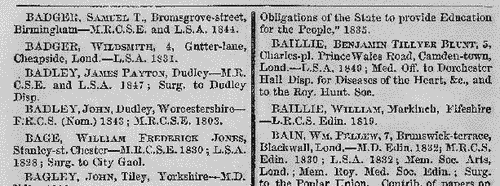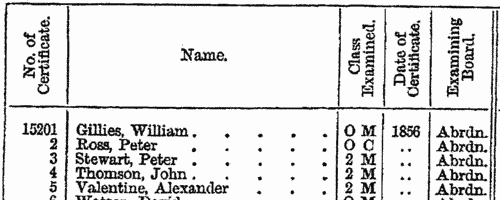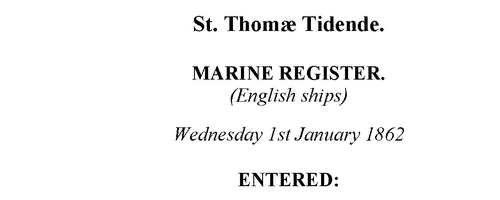Collie Surname Ancestry ResultsOur indexes 1000-1999 include entries for the spelling 'collie'. In the period you have requested, we have the following 138 records (displaying 41 to 50): Single Surname Subscription | | | Buying all 138 results of this search individually would cost £716.00. But you can have free access to all 138 records for a year, to view, to save and print, for £100. Save £616.00. More... |
These sample scans are from the original record. You will get scans of the full pages or articles where the surname you searched for has been found. Your web browser may prevent the sample windows from opening; in this case please change your browser settings to allow pop-up windows from this site. Medical Men
(1853)
The British Medical Directory for England, Scotland, and Wales of 1853 lists doctors, physicians, surgeons and other medical men. Each entry gives full name, surname first; address; qualifications; public appointments; and (where appropriate) a list of books and of works published in medical journals.COLLIE. Cost: £4.00.  | Sample scan, click to enlarge

| Scottish Partnerships Dissolved and Trustees of Bankrupts
(1854)
Trading partnerships dissolved in Scotland, and appointment of trustees for Scotch Sequestrations: business failure and bankruptcy often caused people to restart their lives elsewhere, so these are an important source for lost links
COLLIE. Cost: £6.00.  | Sample scan, click to enlarge

|  Persons of standing recommending London police recruits
(1843-1857) Persons of standing recommending London police recruits
(1843-1857)
The Metropolitan Police Register of Joiners (MEPO 4/334) lists policemen joining the force 1 January 1843 to 1 April 1857 (warrant numbers 19893 to 35804). The register is alphabetical, in so far as the recruits are listed chronologically grouped under first letter of surname. It gives Date of Appointment, Name, Number of Warrant, Cause of Removal from Force (resigned, dismissed, promoted or died), and Date of Removal. Although the register was closed for new entrants at the end of 1842, the details of removals were always recorded, some being twenty or more years later. Those recruits not formerly in the police, the army, or some government department, were required to provide (normally) at least two letters of recommendation from persons of standing, and details of these are entered on the facing pages. Where a recruit was only recently arrived in the metropolis, the names and addresses of the recommenders can be invaluable for tracing where he came from. Those recruits not formerly in the police, the army, or some government department, were required to provide (normally) at least two letters of recommendation from persons of standing, and details of these are entered on the facing pages: the names in these are indexed here (the police recruits are indexed separately and not included here). Recruits transferred from other forces or rejoining the force did not normally need recommendations - in the latter case, former warrant numbers are given - but some recommendations are from police inspectors, even other constables. Recruits coming from the army sometimes have general military certificates of good conduct, but most often have a letter from their former commanding officer; recruits recommended by government departments (most often the Home Office) similarly have letters from the head of department. But the great majority of the names and addresses in these pages are of respectable citizens having some sort of personal acquaintance with the recruit. Where more than two recommendations were provided, the clerk would only record one or two, with the words 'and others'. Tradesmen are sometimes identified as such by their occupations; there are some gentry. Although the bulk of these names are from London and the home counties, a scattering are from further afield throughout Britain and Ireland. COLLIE. Cost: £8.00.  | Sample scan, click to enlarge

| Masters and Mates of Merchantmen: Certificates of Competency
(1857)
The Mercantile Navy List and Annual Appendage to the Commercial Code of Signals for All Nations, edited by J. H. Brown, was published By Authority in 1857. It includes this full list of 'Masters and Mates who have passed their examination and obtained Certificates of Competency', from number 1 to number 15816, except for those whose certificates had been cancelled. The first column gives the number of certificate; the second column full name, surname first (an asterisk before the name denotes those who are found qualified to act in fore and aft-rigged vessels only; two vertical lines denotes in North Wales fishery only; a double dagger, passed the examination in steam; and a dagger refers to honorary testimonials, details of which are printed at the end of the section. A B C D are the distinguishing letters for the four classes of Meteorological Observers); third column, class examined (1 ex, 1, 2 and 3 denote First Extra, First, Second and Third Class Master's Certificate, granted under the Voluntary Examination, by Order in Council dated August 1845; Ex C, Master Extra; O C, Master Ordinary; 1 M, First Mate; O M, Only Mate; 2 M, Second Mate; L. R. N., Lieutenant Royal Navy; M. R. N., Master Royal Navy; E. I. C., East India Company; M. I. N., Master Indian Navy.); fourth column, year of certificate (where there are two dots, this is to represent a 'ditto' to the year next above); fifth column, Examining Board (Aberdeen, Belfast, Bristol, Cork, Dublin, Dundee, Glasgow, Greenock, Hull, Leith, Liverpool, London, Newcastle, Plymouth, Shields or Sunderland).COLLIE. Cost: £4.00.  | Sample scan, click to enlarge

| Scottish Partnerships Dissolved and Bankruptcy Proceedings
(1857)
Dissolutions of business partnerships, and proceedings in bankruptcy in ScotlandCOLLIE. Cost: £6.00.  | Sample scan, click to enlarge

| Scottish Bankrupts
(1858)
Perry's Bankrupt and Insolvent Gazette, issued monthly, included lists of sequestrations of Scottish bankrupts' estates. The initial entry gives the name of the bankrupt (surname first, in capitals), trade and address; the dates and place of the stages of the sequestration process, and the date by which claims against the estate were to be lodged. This is the index to the names of the bankrupts, from the issues from January to December 1858: it also covers dissolutions of partnerships in Scotland, and the names of trustees, assignees, attorneys &c. mentioned in these Scottish cases.COLLIE. Cost: £6.00.  | Sample scan, click to enlarge

|  British infantry fighting in China
(1858-1860) British infantry fighting in China
(1858-1860)
The China Medal was awarded to soldiers and sailors who took part in the prosecution of the war against the Chinese from 1856 to 1860. Separate clasps were awarded for men who had been in receipt of the China Medal of 1842; for being actually present at Canton on 28 and 29 December 1857, when that city was bombarded and finally captured; for being actually engaged in the operations which ceased with the first capture of the Taku Forts, 20 May 1858, and led to the Treaty of Tientsin; for being actually present at the capture of the Taku Forts 21 August 1860; and for being actually present before Pekin the day the gate of that city was given up to the allied (British and French) army, viz. on 13 October 1860. The 2nd battalion, the 1st (The Royal) Regiment of Foot, based at Birr, left Ireland for Cephalonia 31 January 1853. After fighting in the Crimea, the battalion was moved to Malta, then to Gibraltar; was transferred from Gibraltar to China in 1858; and did not return to England until 1861. The battalion took part in the capture of the Taku Forts and that of Pekin.COLLIE. Cost: £8.00.  | Sample scan, click to enlarge

| Contributors to Female Missions of the Church of Scotland: Aberdeen
(1861-1862)
Contributions received on behalf of the Ladies' Association for Promoting the Education of Jewish Females; from 30 November 1861 to 30 November 1862COLLIE. Cost: £6.00.  | Sample scan, click to enlarge

| Masters of English Merchantmen at St Thomas (1862)
The custom house at St Thomas, a Danish colony in the West Indies, issued daily lists of ships entered and cleared, which were published as the Marine Register in the twice weekly polyglot newspaper St Thomae Tidende. The reports of entries give precise date of arrival, nationality, type and name of the vessel (sailing ships in italics, steamships in capitals), the captain's surname (in bold), and whence the ship had come, sometimes adding a brief note about the cargo. The lists of ships cleared for departure have similar details, but with the ship's proposed destination. St Thomas was an important harbour not only serving inter-island Caribbean trade, and trading with England and the north and south American colonies, but also as an entrepot or intermediate destination, ships leaving with goods imported from elsewhere. A large proportion of the shipping was English, virtually all the steamers flying the Red Ensign.
COLLIE. Cost: £8.00.  | Sample scan, click to enlarge

| Mercantile Marine Service Association
(1868)
List of members and Associates of the Mercantile Marine Service Association, based in Liverpool: a indicates associate, c captain, and m mateCOLLIE. Cost: £4.00.  | Sample scan, click to enlarge

|
Research your ancestry, family history, genealogy and one-name study by direct access to original records and archives indexed by surname.
|













